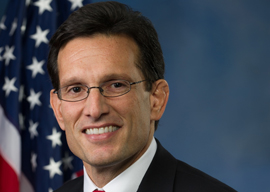
June 13, 2014

Eric Cantor
“I hold it that a little rebellion now and then is a good thing, and as necessary in the political world as storms in the physical.”
If Thomas Jefferson’s benign reflection on Shays’ Rebellion, that uprising of farmers in 1786 and 1787, is not the first thought that comes to mind today for his fellow Virginian Eric Cantor, surely it is understandable.
For the rebellious subjects of the 7th Congressional District just voted to end Cantor’s career as House majority leader.
Many lessons are being read into and taken away from Cantor’s defeat. But that election has also revealed a populist path, both to the Republican nomination in 2016 and perhaps to the presidency.
For what were the elements of Randolph-Macon College professor Dave Brat’s victory and of Cantor’s defeat?
First, the perception that Cantor was willing to do a deal with Barack Obama to provide a partial amnesty to illegal immigrants—while the media provided wall-to-wall coverage of the latest invasion across our southern border—proved devastating.
Talk radio, led by Laura Ingraham and Mark Levin, pounded Cantor on the issue of illegal immigration, the emotive power of which our Beltway elites will never understand.
For like Eurocrats, the leaders of our Beltway parties call to mind the “sophisters” and “calculators” of Edmund Burke’s depiction.
They do not understand people of the heart to whom illegal and mass immigration means the disappearance of the country they grew up in and the dispossession of their children of what is most precious to them.
Then there is populism. Cantor spent $5 million, an astonishing sum in a congressional primary, 50 times what Brat spent. Yet he only reinforced his image as a poodle of Wall Street and K Street.
Of the bank bailout that Cantor supported, Brat was brutally effective.
“All the investment banks up in New York and D.C. … those guys should have gone to jail. But instead of going to jail … they went onto Eric’s Rolodex. … And they’re sending him big checks.”
Brat also had going for him that he is an outsider, when those in the capital are widely disliked, distrusted or even detested by Middle America.
Anti-establishment, outsider, defender of national borders—these were the cards Brat was holding, even if he had little money or organized support.
Yet were these not the same issues and stances of the candidates and parties that jolted Europe in May by running first in the EU elections?
In the endless struggle between populism and the establishment and between nationalists and internationalists, populists and nationalists appear, at least temporarily, to be in the ascendancy worldwide.
Vladimir Putin’s approval is over 80 percent. Why? He stands for national sovereignty and the rights of Russians, wherever they may be. And in hearing his claim that Crimea is Russia’s, are there not echoes of Reaganite nationalism in the Panama Canal debate:
“We bought it. We paid for it. It’s ours. And we’re gonna keep it.”